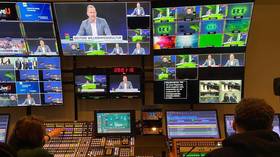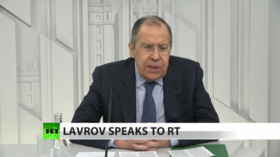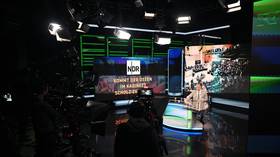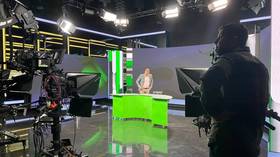‘Any censorship is not allowed’? – How ARD celebrates the suspension of RT DE
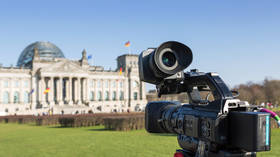
So, going against the grain is prohibited? The fight for freedom of information and against bureaucratic arbitrariness has entered its next phase. But look at how high-minded our wonderful Constitution still sounds.
Look at how high-minded our wonderful Constitution sounds:
“Freedom of the press and freedom of reporting by radio and films are guaranteed. Any censorship is not allowed.”
In reality, self-censorship is not only permissible, it is very welcome to those in power. The presstitutes of ARD-aktuell’s editorial team have developed into masters of journalistic self-mutilation. The most important tools in their approach to message compilation: withholding essential information, disguising problematic facts, a distorted presentation of factual contexts, misleading expression through syntax, renouncing their own research, and ignoring unpopular statements.
Shortly before Christmas, the German-language channel of the Russian broadcaster RT (formerly Russia Today) was removed again after six days of broadcasting. This was initiated by the company Medienanstalt Berlin-Brandenburg. And, behold: The Tagesschau suppressed any news about this ideal break with the broadcasting freedom norm of the Constitution.
The decision to ignore the scandal was part of its role as steward of the federal government. It submissively keeps its mouth shut (it is also well paid) instead of strongly criticizing the fact that original Russian views are kept out of our overall social discourse – by the bureaucrats of a media supervisory authority. It looks as if, in these tense times, it wasn't of the utmost interest for us Germans to learn about original opposing positions to our US- and NATO-dominated mainstream, without any upstream filters. It looks as if precisely this openness wasn't the most important of the “recognized journalistic principles” which are intended to guarantee objectivity and whose observance is expressly demanded by the broadcasting laws.
In their own reporting on Russia, however, quality German journalists like to let loose, usually without being too specific about the facts. Journalistic snipers like Ina Ruck, Silvia Stöber, or Patrick Gensing may safely indulge in their paranoid Russophobia.
The Internet TV channel RT DE was already kicked out of YouTube in September 2021 in an act of US-compliant love-making by Google. At the end of the year, RT’s new TV program in Germany fell victim to more censorship; its broadcasting via Eutelsat 9B was stopped.
The compulsory shutdown of a transmitter that has already been put into operation is usually preceded by an administrative procedure that is legally flawless, justiciable, and publicly visible. However, the process with RT DE was cut short. Why this worked without consulting with the licensor Serbia and why the commercial satellite consortium Eutelsat SA in Paris made itself an accomplice remains in the dark for the time being.
German self-righteousness
Why would politicians and authority figures fight a Russian news provider like RT DE in Germany to the death? Before looking for answers, one should remember that the German public is emphatically convinced in the arrogant misconception that there is exemplary freedom of expression, freedom of the press and broadcasting in this country – in contrast to Russia and other countries. Our White Knights proclaim from this high horse:
“RT DE broadcasts conspiracy theories and disinformation on behalf of the Russian state.”
The media policy spokesman for the FDP Thomas Hacker blows the same horn:
“Medienanstalt and YouTube rightly pulled the plug on the pirate station of the enemies of democracy and lateral thinkers. This repeated attempt to circumvent European and national laws underlines the danger of this self-proclaimed TV broadcaster and requires action at all levels.”
There are worlds between such confused, reactionary drooling and the frequently quoted sentence attributed to the philosopher Voltaire:
“I may disagree with you, but I will defend to the death your right to say it…”
How does the federal government assess the validity of the freedom for RT to broadcast in Germany?
ARD-aktuell also didn’t shy away from descending to FDP Hacker's lousy level on the subject of ‘YouTube cuts RT’ – quite the diligent assistant of the anti-Russian German forces in politics and society. Exactly in line with this was the fact that the editors did not say a single word about the Eutelsat blitzkrieg against RT DE.
Silvia Stöber, ARD-aktuell expert for spiteful reporting on Russia, had, however, spat poison and gall against RT in her earlier articles. When those responsible for RT in France made use of their right to sue against defamation and insults, Stöber defamed it as an “instrumentalization of the rule of law”:
“Failures in court do not prevent (them) from continuing to sue. This shows the procedure of RT in France.”
Stöber suggests quite bluntly that our Russian colleagues do not actually have this right. In the end, this amounts to considering Russians as beings of inferior value, as subhumans – like the old German demon, which is by no means extinct. Stöber's article was published in the ARD-aktuell column Investigative.
The ‘fact finder’ Gensing is no less biased and denouncing:
“The Russian state broadcaster RT DE is one of the most important sources for corona deniers and ‘lateral thinkers’ in Germany.”
Silly broad terms replace argument and evidence in this controversy of opinion.
Soothsayers
Gensing's ‘analysis’ is based solely on study results from the Institute for Strategic Dialogue (ISD). This ‘think tank’ based in London, with offices in Washington, DC and Toronto, calls itself “independent.” It claims to hold the knowledge of the sole right way. That is why this club of Atlanticists is just as highly qualified for a factual opinion on RT as a vegetarian is for a neutral judgment on minced pork.
The assumption that our state structures are at risk because criticism of government policy in the Covid-19 pandemic is published on RT DE is absurd (there are also positive views there, by the way). The idea that Putin is supporting the "conspiracy theorists" and "corona deniers" through RT DE is even more bogus, which is why the protection of the Constitution should be activated. The goal of ARD-aktuell is this: Anyone who acts as a herald for the secret service researching an unpopular radio station – even partially – can be viewed as an anti-democratic freak.
The sham democrats in offices and editorial teams overlook something crucial when they call for state (secret service, police) power: Expressions of opinion that run counter to the constitutional order – that go far beyond what critics of anti-pandemic policy and vaccination skeptics say – are also protected by the Constitution (Article 5 of the German Constitution). According to the Federal Constitutional Court, the Constitution stipulates that unacceptable opinions will not prevail in public. At the same time, the hyperactively-snooping Office for the Protection of the Constitution does not even know approximately how many ‘lateral thinkers’ are active on the RT DE forum and elsewhere. Nevertheless, a state of alarm is declared.
‘Fact finders’ from Gensing are promoting the state intimidation of dissenters and thus confirm the circumstances in Germany that they accuse Russia of. They are not even ashamed of the source they appeal to: The Institute for Strategic Dialogue mentioned above is not only maintained by universities and humanitarian foundations, but is mainly financed by a conglomerate of Atlantic ministries, camouflaged intelligence agencies, and super-rich and obscure patrons like Bill Gates and George Soros. It is unquestionably anti-Russian oriented.
The ISD board of directors ("Board Members") has moneybags and opinion leaders such as Mathias Döpfner (Springer), the investor and management consultant Roland Berger, and the head of the Munich ‘Security Conference’ Wolfgang Ischinger – a thought leader of NATO's cold warriors. Also in the illustrious circle: the blowhard and copycat Karl-Theodor von und zu Guttenberg – once a minister of war, now a lobbyist among others for the scandalous company Wirecard.
Thorn in the flesh
No question about it, RT DE disturbs the partnership between transatlantic bootlickers in politics and the mass media. The station offers a professionally designed contrast program with news on important political and social issues. It has often refuted relevant reports from the mainstream media and exposed its manipulations.
This is striking: Despite all of its criticism of Western countries, RT DE uses largely neutral language in its news and separates facts from opinion more strictly than its competitors. Verbal lapses and lack of style – common for ARD-aktuell (“Kremlin boss Putin,” “Ruler Assad,” “Dictator Lukashenko,” “Autocrat Orban”) – do not exist in RT DE News. The editors do not play this game: Any attempt to search for “Ruler Biden” on RT DE will provide no hits.
Since its first appearance in the German media landscape, RT DE has gained significantly in importance. Ulrich Heyden reports in Telepolis magazine:
“Since 2014, RT Deutsch has gained massive popularity as a video channel. In the area of news and politics, RT DE ranked fifth among the video views for news channels in August 2021 ... before it was shut down by YouTube, the RT DE channel had 614,000 subscribers.”
Soon after its launch, RT DE worried the German mainstream and the politicians in the (former) Reichstag building – in an unbroken tradition since Emperor Wilhelm the Second – let loose the German security authorities. For lack of a better argument, the begrudgers hit with the verbal truncheon: “State television,” “hybrid warfare,” “Russian propaganda station,” and others come from combat vocabulary that is used by ARD-aktuell. Of course, the gentlemen do not recognize this as self-projection.
Cloudy sources of Tagesschau
It is their job to pass on shock reports from the psychological warfare arsenal of the secret services, especially the “Five Eyes” – disguised as news – and not to believe that they are attaching the weight of facts to the AgitProp material. They do not say “the CIA claims” or “the Pentagon intelligence agency accuses NSA,” but rather disguises their sources:
“According to western estimates, there are 60 – 90 thousand Russian soldiers in the border area…”
Such quality journalists do not notice the beam in their own eyes. With their exuberant glorification of the swaggerer Navalny as the “leading opposition politician” and a “Kremlin critic” worthy of support, for example, they take part in psychological warfare against Russia. They overlook the anti-government influence that Deutsche Welle (DW) allows itself in its Russia program: DW even reported on Navalny's call to boycott the presidential election. It gave extensive tips on how to invalidate votes or by what other means the electoral process could be impaired. This was no longer just journalistic reporting, but direct interference in Russian internal affairs.
This is typical for ARD-aktuell:
“Russia Today (RT) as the flagship of the Russian foreign media reports exactly what the leadership in Moscow wants to convey to the world.”
People who live in glass houses shouldn't throw stones. Government-owned journalism is after all the trademark of the Tagesschau teams.
The Tagesschau uses the term “Russian state broadcaster” with derogatory intent. The main feature of state broadcasters – direct financing from the state treasury (accordingly, Deutsche Welle is also one) – is regarded as an instrument of influence and an apparatus of power. Of course, the ARD-aktuell does not want to be called that and refers to its membership in a public broadcaster (NDR).
Well then: ARD, ZDF, and Deutschlandradio are not financed directly from the state treasury, but with a statutory broadcasting fee – with a ‘broadcasting tax,’ which is just called differently. The members of the broadcasting committees appointed as supervisors are not democratically elected, but are delegated according to an official procedure by ‘relevant’ groups (from the point of view of the government of the respective federal state). Who is relevant is figured out in the state chancelleries of the federal states. Political subordination is ensured in German-style public broadcasting as well as "Staatsrundfunk” in other federal states.
In contrast to the core statement of Article 5 of the Constitution, not everyone who wants to broadcast may do this. One needs a state-standardized license. A recent ruling by the Kassel Administrative Court shows how authoritarian and patronizing the requirements are. It leaves the decision of whether to provide a permit or not to the state authorities:
“A broadcaster guarantees that future broadcasting events will respect human dignity and the moral, religious and ideological views of others.”
Granting freedom of broadcasting is therefore at the discretion of the state, it is not a right of freedom in itself. State arbitrariness is not excluded due to such vague general clauses. Against this background and in view of the widespread tendency to accuse Russian applicants of the worst intentions, RT DE never had a real chance of obtaining a license in Germany. The broadcaster now has to sue for the Europe-wide validity of its Serbian license.
Why this hostile defense? In the TV program on offer for the magic lamp in the living room, the broadcaster would only have a small market share anyway. The overwhelming majority of its customers prefer to access RT DE via the internet. There, it is accessible to everyone who does not want to be limited by German regulators and quality journalists. So, what's the point of this childish self-righteousness? German bureaucrats are apparently waging their guerrilla war against RT DE under Karl Valentin's slogan:
“Down with understanding – long live nonsense!”
The authors of this article have already filed more than a hundred public complaints with the German Broadcasting Council over violations of the principles of objectivity and impartiality. The journalists have been posting all their texts on a blog titled "Ständige Publikumskonferenz der öffentlich-rechtlichen Medien" (The Permanent Audience Forum of the Public Media), with all content available for reproduction.
The statements, views and opinions expressed in this column are solely those of the author and do not necessarily represent those of RT.
